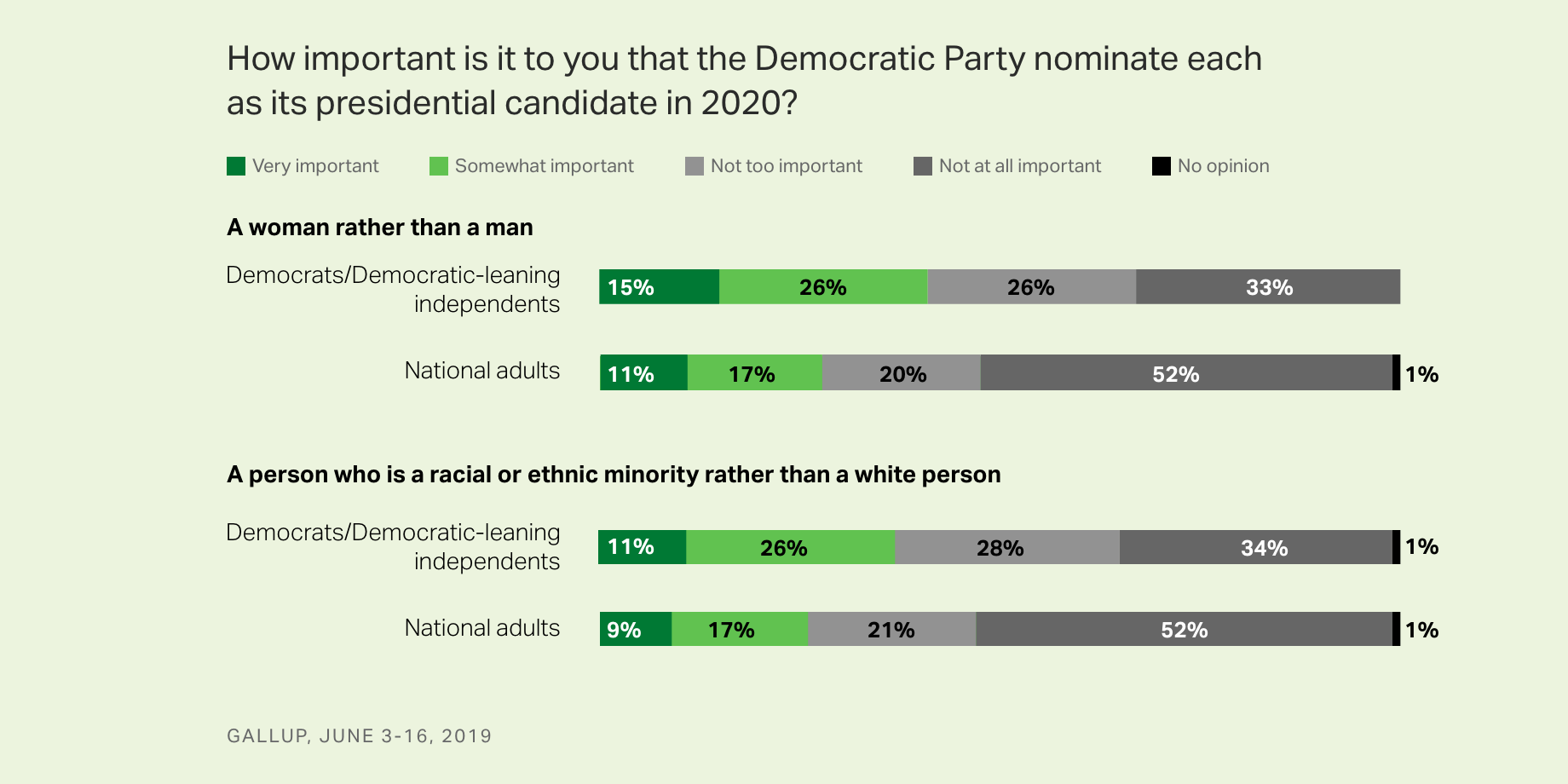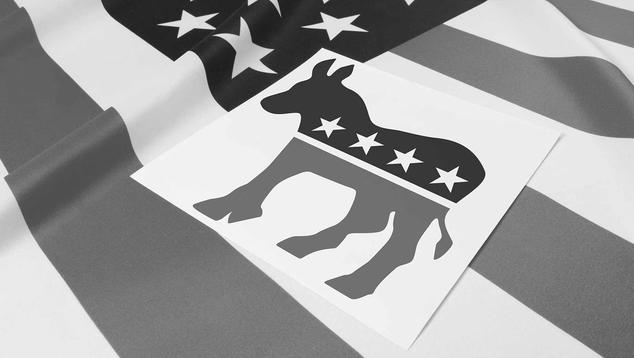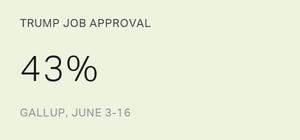Story Highlights
- Democrats prioritize ability to beat Trump (58%) over issue stances (39%)
- 59% of Democrats say it is not important for nominee to be a woman
- 62% of Democrats say it's not important nominee is racial/ethnic minority
WASHINGTON, D.C. -- The two dozen Democratic candidates currently vying for the chance to unseat President Donald Trump in 2020 are an ideologically and demographically diverse group, with wide-ranging views on major issues of the day.
Yet, given a choice, 58% of Democrats and Democratic-leaning independents prioritize a candidate's ability to beat Trump over their views on important issues. Majorities of Democrats also say it is not important that their party's presidential nominee be a woman or a person who is a racial or ethnic minority.
Divergent Views Among Several Demographic Subgroups
Results from Gallup's question pitting electability against agreement on issues (included in May 15-30 and June 3-16 polling of nearly 1,000 Democrats and Democratic-leaning independents) vary significantly among several demographic subgroups -- namely by gender, age and education.
Gender: Democratic men are more likely than Democratic women to prioritize agreement on issues, 44% to 36%.
Age: In a sign that idealism yields to practicality with age, 56% of Democrats aged 18 to 29 prefer a candidate they agree with on issues, while majorities in each of the other three age groups favor a candidate's ability to beat Trump.
Education: Democrats with at least some college education (63%) are more likely than those without any college education (49%) to prefer a candidate who could beat Trump.
| Agrees on issues | Best chance beating Trump | |||||||||||||||||||||||||||||||||||||||||||||||||||||||||||||||||||||||||||||||||||||||||||||||||||
|---|---|---|---|---|---|---|---|---|---|---|---|---|---|---|---|---|---|---|---|---|---|---|---|---|---|---|---|---|---|---|---|---|---|---|---|---|---|---|---|---|---|---|---|---|---|---|---|---|---|---|---|---|---|---|---|---|---|---|---|---|---|---|---|---|---|---|---|---|---|---|---|---|---|---|---|---|---|---|---|---|---|---|---|---|---|---|---|---|---|---|---|---|---|---|---|---|---|---|---|---|
| % | % | |||||||||||||||||||||||||||||||||||||||||||||||||||||||||||||||||||||||||||||||||||||||||||||||||||
| Total Democrats | 39 | 58 | ||||||||||||||||||||||||||||||||||||||||||||||||||||||||||||||||||||||||||||||||||||||||||||||||||
| Gender | ||||||||||||||||||||||||||||||||||||||||||||||||||||||||||||||||||||||||||||||||||||||||||||||||||||
| Men | 44 | 54 | ||||||||||||||||||||||||||||||||||||||||||||||||||||||||||||||||||||||||||||||||||||||||||||||||||
| Women | 36 | 60 | ||||||||||||||||||||||||||||||||||||||||||||||||||||||||||||||||||||||||||||||||||||||||||||||||||
| Age | ||||||||||||||||||||||||||||||||||||||||||||||||||||||||||||||||||||||||||||||||||||||||||||||||||||
| 18-29 | 56 | 43 | ||||||||||||||||||||||||||||||||||||||||||||||||||||||||||||||||||||||||||||||||||||||||||||||||||
| 30-49 | 42 | 55 | ||||||||||||||||||||||||||||||||||||||||||||||||||||||||||||||||||||||||||||||||||||||||||||||||||
| 50-64 | 31 | 67 | ||||||||||||||||||||||||||||||||||||||||||||||||||||||||||||||||||||||||||||||||||||||||||||||||||
| 65+ | 23 | 71 | ||||||||||||||||||||||||||||||||||||||||||||||||||||||||||||||||||||||||||||||||||||||||||||||||||
| Education | ||||||||||||||||||||||||||||||||||||||||||||||||||||||||||||||||||||||||||||||||||||||||||||||||||||
| No college | 48 | 49 | ||||||||||||||||||||||||||||||||||||||||||||||||||||||||||||||||||||||||||||||||||||||||||||||||||
| Some college | 34 | 63 | ||||||||||||||||||||||||||||||||||||||||||||||||||||||||||||||||||||||||||||||||||||||||||||||||||
| Based on Democrats and Democratic-leaning independents | ||||||||||||||||||||||||||||||||||||||||||||||||||||||||||||||||||||||||||||||||||||||||||||||||||||
| GALLUP, May 15-30 and June 3-16, 2019 | ||||||||||||||||||||||||||||||||||||||||||||||||||||||||||||||||||||||||||||||||||||||||||||||||||||
Gallup previously asked this question in the runup to the 2004 and 2012 elections. A poll conducted before voting began in the 2004 Democratic primaries found that half of Democrats and Democratic-leaning independents preferred a candidate who agreed with them on issues and 44% favored one who could beat George W. Bush. However, after the Iowa caucuses and New Hampshire primary, their views were in line with the most recent findings -- a nominee's electability outweighed commonality on issues.
In late 2011, Republicans and Republican-leaning independents held views similar to their Democratic counterparts today. More than half of Republicans (53%) preferred a nominee who had the best chance of beating Barack Obama while 43% favored a nominee who agreed with them on key issues. Although Republican challenger Mitt Romney was viewed by Republicans as having the best chance of beating Obama, ultimately, Obama held on to win a second term.
| June 2019 (Democrats) | September 2011 (Republicans) | February 2004 (Democrats) | |||||||||||||||||||||||||||||||||||||||||||||||||||||||||||||||||||||||||||||||||||||||||||||||||
|---|---|---|---|---|---|---|---|---|---|---|---|---|---|---|---|---|---|---|---|---|---|---|---|---|---|---|---|---|---|---|---|---|---|---|---|---|---|---|---|---|---|---|---|---|---|---|---|---|---|---|---|---|---|---|---|---|---|---|---|---|---|---|---|---|---|---|---|---|---|---|---|---|---|---|---|---|---|---|---|---|---|---|---|---|---|---|---|---|---|---|---|---|---|---|---|---|---|---|---|
| % | % | % | |||||||||||||||||||||||||||||||||||||||||||||||||||||||||||||||||||||||||||||||||||||||||||||||||
| Agrees on issues | 39 | 43 | 40 | ||||||||||||||||||||||||||||||||||||||||||||||||||||||||||||||||||||||||||||||||||||||||||||||||
| Best chance of beating opponent | 58 | 53 | 55 | ||||||||||||||||||||||||||||||||||||||||||||||||||||||||||||||||||||||||||||||||||||||||||||||||
| GALLUP | |||||||||||||||||||||||||||||||||||||||||||||||||||||||||||||||||||||||||||||||||||||||||||||||||||
Gender and Racial Preferences for Democratic Nominee
The 2018 midterm elections brought big gains for Democratic minorities and women seeking national office -- and while the current field of Democratic presidential candidates is the most diverse in history, it still includes more white men than women or minorities. Two recent Gallup polls (conducted April 17-30 and June 3-16) indicate that Democrats and Democratic-leaning independents do not have strong preferences for the gender and race/ethnicity of their party's candidate.
Roughly six in 10 Democrats say it is not important to them that the Democratic Party nominate a woman (59%) or someone who is a racial or ethnic minority (62%). Yet, the 41% of Democrats who say having a woman as the Democratic presidential candidate is important is significantly more than the 28% of all U.S. adults who say the same.
Likewise, more Democrats (37%) than adults nationally (26%) think it is important to have a nonwhite person running against Trump, while a majority of Democrats (62%) do not consider it to be important.

While Democratic women are more likely than Democratic men to say it is important that their party nominates a woman in 2020, a slim majority of Democratic women (53%) do not consider it important.
| Very important | Somewhat important | Not too important | Not at all important | ||||||||||||||||||||||||||||||||||||||||||||||||||||||||||||||||||||||||||||||||||||||||||||||||
|---|---|---|---|---|---|---|---|---|---|---|---|---|---|---|---|---|---|---|---|---|---|---|---|---|---|---|---|---|---|---|---|---|---|---|---|---|---|---|---|---|---|---|---|---|---|---|---|---|---|---|---|---|---|---|---|---|---|---|---|---|---|---|---|---|---|---|---|---|---|---|---|---|---|---|---|---|---|---|---|---|---|---|---|---|---|---|---|---|---|---|---|---|---|---|---|---|---|---|---|
| % | % | % | % | ||||||||||||||||||||||||||||||||||||||||||||||||||||||||||||||||||||||||||||||||||||||||||||||||
| Male Democrats | 13 | 22 | 27 | 38 | |||||||||||||||||||||||||||||||||||||||||||||||||||||||||||||||||||||||||||||||||||||||||||||||
| Female Democrats | 17 | 30 | 25 | 28 | |||||||||||||||||||||||||||||||||||||||||||||||||||||||||||||||||||||||||||||||||||||||||||||||
| Combined data from April 17-30 and June 3-16; Based on Democrats and Democratic-leaning independents | |||||||||||||||||||||||||||||||||||||||||||||||||||||||||||||||||||||||||||||||||||||||||||||||||||
| GALLUP | |||||||||||||||||||||||||||||||||||||||||||||||||||||||||||||||||||||||||||||||||||||||||||||||||||
Nonwhite Democrats are slightly more likely than white Democrats to think it is important that their party nominates a racial or ethnic minority as its candidate. Still, less than a majority of nonwhites think it is important to have a nominee who is a racial or ethnic minority. Democratic women are somewhat more likely than Democratic men to say nominating a nonwhite person is important.
| Very important | Somewhat important | Not too important | Not at all important | ||||||||||||||||||||||||||||||||||||||||||||||||||||||||||||||||||||||||||||||||||||||||||||||||
|---|---|---|---|---|---|---|---|---|---|---|---|---|---|---|---|---|---|---|---|---|---|---|---|---|---|---|---|---|---|---|---|---|---|---|---|---|---|---|---|---|---|---|---|---|---|---|---|---|---|---|---|---|---|---|---|---|---|---|---|---|---|---|---|---|---|---|---|---|---|---|---|---|---|---|---|---|---|---|---|---|---|---|---|---|---|---|---|---|---|---|---|---|---|---|---|---|---|---|---|
| % | % | % | % | ||||||||||||||||||||||||||||||||||||||||||||||||||||||||||||||||||||||||||||||||||||||||||||||||
| White Democrats | 5 | 31 | 32 | 32 | |||||||||||||||||||||||||||||||||||||||||||||||||||||||||||||||||||||||||||||||||||||||||||||||
| Nonwhite Democrats | 19 | 21 | 23 | 36 | |||||||||||||||||||||||||||||||||||||||||||||||||||||||||||||||||||||||||||||||||||||||||||||||
| Male Democrats | 10 | 24 | 24 | 41 | |||||||||||||||||||||||||||||||||||||||||||||||||||||||||||||||||||||||||||||||||||||||||||||||
| Female Democrats | 12 | 28 | 31 | 28 | |||||||||||||||||||||||||||||||||||||||||||||||||||||||||||||||||||||||||||||||||||||||||||||||
| Combined data from April 17-30 and June 3-16; Based on Democrats and Democratic-leaning independents | |||||||||||||||||||||||||||||||||||||||||||||||||||||||||||||||||||||||||||||||||||||||||||||||||||
| GALLUP | |||||||||||||||||||||||||||||||||||||||||||||||||||||||||||||||||||||||||||||||||||||||||||||||||||
Bottom Line
As the Democratic candidates prepare to square off in the first presidential primary debates, most rank-and-file Democrats prioritize defeating Trump over issue compatibility. Recent Gallup data show that Democrats' perceptions of a candidate's electability outrank their positions on important issues. A majority of Democrats also do not think it is important for their party to nominate a woman or a nonwhite person.
The diverse field of Democratic presidential candidates would be well-advised to focus their debate performances and campaign strategies on looking like they can beat Trump instead of worrying about highlighting their issues positions.
Learn more about how the Gallup Poll Social Series works.




